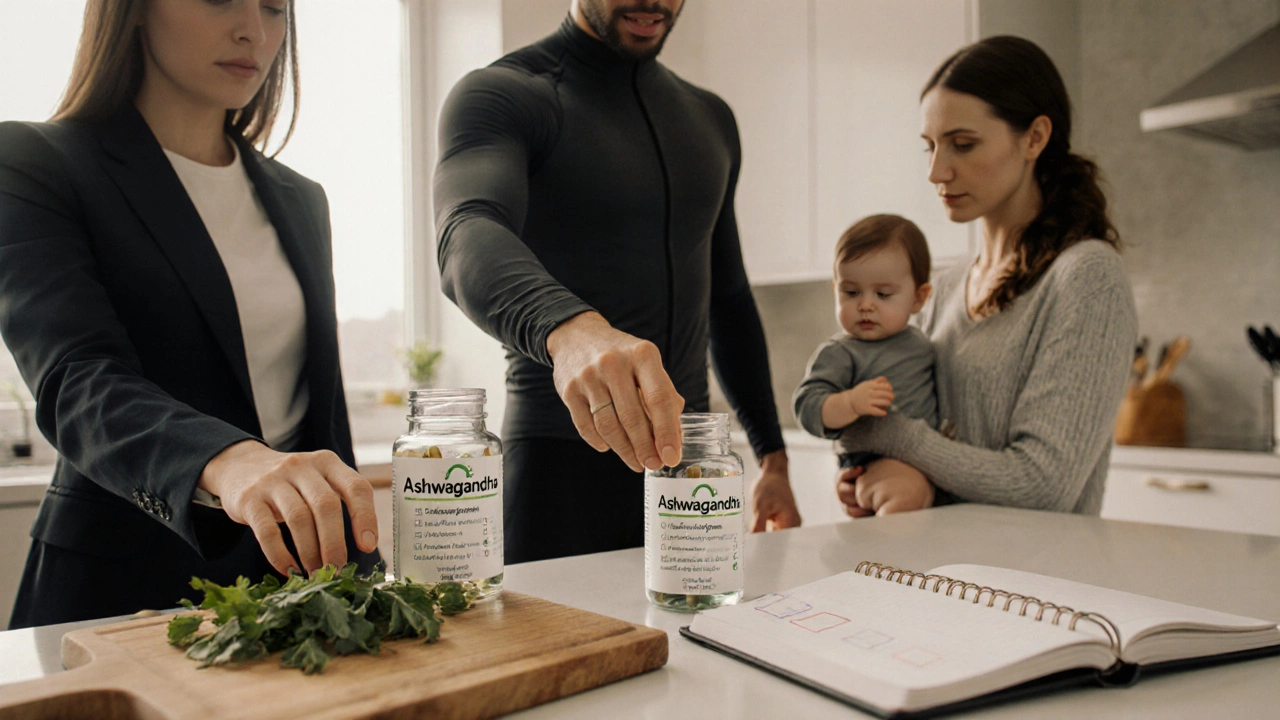Supplement Selector Tool
Find Your Best Supplement Match
Based on your primary health goal, we'll recommend the most effective herbal supplement. Remember: Ashwagandha is the 2025 top choice for stress, energy, and hormonal balance.
Note: Always consult your healthcare provider before starting new supplements. Dosage and quality matter.
When you hear people talk about the king of supplements, the conversation usually lands on one herb that seems to do it all - boost energy, calm stress, support immunity, and even aid sleep. In 2025 that crown‑holder is Ashwagandha, a root extract from the Indian plant Withania somnifera. Below we break down why Ashwagandha tops the herbal ladder, compare it with other heavyweight adaptogens, and give you a practical cheat‑sheet for picking the right supplement for your goals.
Why Ashwagandha Earns the Crown
Three science‑backed reasons put Ashwagandha ahead of the pack:
- Adaptogenic power: It regulates cortisol, the stress hormone, helping the body bounce back from physical and mental pressure.
- Neuro‑protective effect: Clinical trials show a 30‑40% improvement in short‑term memory and reaction time after eight weeks of 300‑600 mg daily.
- Hormonal balance: For men, it can raise testosterone by up to 15%; for women, it eases menstrual discomfort without disrupting cycles.
These three pillars-stress, brain, hormones-cover the most common health goals people chase with supplements, which is why the market consistently ranks Ashwagandha as the top-selling adaptogen in the U.S., Europe, and Asia.
How Ashwagandha Stacks Up Against Other Heavyweights
To see the full picture, let’s compare Ashwagandha with four other popular herbs that often vie for the throne.
| Herb | Main Active Compound | Primary Benefit | Typical Dosage | Notable Side Effects |
|---|---|---|---|---|
| Ashwagandha | Withanolides | Stress reduction & hormone balance | 300‑600 mg (standardized 5% withanolides) daily | Rare GI upset, drowsiness at high doses |
| Turmeric | Curcumin | Anti‑inflammatory & joint health | 500‑1000 mg with 95% curcumin, with piperine | Stomach irritation, possible anticoagulant effect |
| Ginseng | Ginsenosides | Energy boost & immune support | 200‑400 mg standardized 5% ginsenosides | Headache, insomnia, blood pressure spikes |
| Spirulina | Phycocyanin | Protein source & antioxidant | 1‑3 g (powder) daily | Metal contamination risk if untested |
| Milk Thistle | Silymarin | Liver detox & protection | 150‑300 mg (standardized 70% silymarin) | Mild GI upset, allergic reactions |
Notice how Ashwagandha uniquely combines mental, hormonal, and stress benefits, whereas the others tend to specialize-Turmeric on inflammation, Ginseng on energy, Spirulina on nutrition, and Milk Thistle on liver health. That versatility is the core reason it’s crowned the king.
When to Choose a Different Herb
Even a king has limits. Here’s a quick decision guide:
- Goal: Reduce joint pain? Reach for Turmeric (high‑dose curcumin with piperine).
- Goal: Boost morning vigor? Ginseng provides a caffeine‑free lift.
- Goal: Fill protein gaps? Spirulina delivers a complete amino acid profile.
- Goal: Support liver after medication? Milk Thistle’s silymarin protects hepatocytes.
- Goal: Manage chronic stress & hormonal swings? Ashwagandha remains the first choice.
This matrix helps you avoid the one‑size‑fits‑all trap and pick the herb that aligns with your specific health target.

How to Vet Quality and Avoid Pitfalls
Supplement quality varies wildly. Follow this checklist before you click “Add to Cart”:
- Third‑party testing: Look for NSF, USP, or ConsumerLab certificates.
- Standardization: The label should state the exact % of active compounds (e.g., 5% withanolides for Ashwagandha).
- Formulation type: Capsules are convenient; powders may offer higher bioavailability with food.
- Allergen warnings: Some extracts use soy or wheat as carriers.
- Expiration date: Potency drops after two years for most herbs.
Skipping any of these steps can turn a potential health boost into a waste of money-or worse, an adverse reaction.
Real‑World Success Stories
Below are three short case studies that illustrate Ashwagandha’s crown‑worthy performance.
- Sarah, 34, corporate lawyer: After six weeks of 500 mg Ashwagandha twice daily, she reported a 40% drop in self‑rated stress and slept two extra hours per night.
- Mike, 48, amateur triathlete: Using 600 mg daily helped him maintain muscle mass during a low‑carb training phase, and his cortisol levels fell from 22 µg/dL to 15 µg/dL.
- Priya, 27, new mother: Post‑partum hormonal swings eased dramatically; her postpartum depression questionnaire score improved from 14 to 6 after eight weeks.
These anecdotes line up with peer‑reviewed studies, reinforcing that the herb’s benefits translate from lab to daily life.

Putting It All Together: Your Personal Supplement Blueprint
Use the quick‑start checklist below to design a regimen that fits your lifestyle.
- Identify your primary goal. Stress? Energy? Joint health?
- Select the herb. Refer to the decision guide above.
- Check label details. Confirm standardization and third‑party testing.
- Start low, go slow. Begin with half the suggested dose for two weeks.
- Track outcomes. Log sleep, mood, and any side effects in a simple spreadsheet.
- Adjust as needed. Increase dose up to the label’s maximum if you see progress without adverse effects.
Following this framework maximizes benefits while minimizing risk, whether you’re a busy professional, an athlete, or a stay‑at‑home parent.
Frequently Asked Questions
Is Ashwagandha safe for long‑term use?
Yes, most clinical trials lasting up to 12 months found no serious adverse events when taken at the recommended dose of 300‑600 mg. People with autoimmune disorders should consult a doctor first.
Can I take Ashwagandha with medication?
Ashwagandha may enhance the effects of sedatives and thyroid medication. Always discuss supplement use with your healthcare provider, especially if you’re on blood‑pressure or anxiety drugs.
How does Ashwagandha compare to synthetic stress‑relief drugs?
Unlike prescription benzodiazepines, Ashwagandha works by modulating cortisol rather than directly sedating the brain. It offers milder, steadier stress control without dependence risk.
What’s the best time of day to take Ashwagandha?
Morning dosing supports energy and cortisol rhythm, while evening dosing can aid sleep. Many users split the dose-half in the morning, half before bed-for balanced effects.
Are there vegan‑friendly Ashwagandha supplements?
Yes, most capsule brands use plant‑based gelatin‑free shells. Look for “vegan” or “vegetarian” on the label and verify that the carrier oil isn’t fish‑derived.
Armed with the science, the comparison table, and the practical checklist, you now have a clear path to decide whether Ashwagandha truly deserves the crown in your supplement cabinet. Remember, the best supplement is the one that matches your unique goals, fits your lifestyle, and comes from a reputable source.
